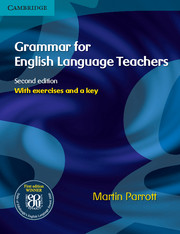12 - Infinitive and -ing forms of verbs
Published online by Cambridge University Press: 09 February 2023
Summary
Key considerations
There are many different contexts where we have to make a choice between an infinitive or -ing form of the verb, and the rules which guide us may seem arbitrary to learners. We need to be wary of focusing on too many of these rules at once; learners usually prefer to have their attention drawn to these, rule by rule, over a period of time.
Mistakes in choosing between infinitive and -ing forms rarely lead to serious misunderstandings. However, most learners make a lot of mistakes and they are often penalised for these mistakes in examinations.
Academic grammars sometimes treat full infinitives after verbs as objects. Course materials, however, usually consider them as a separate category.
Infinitives
What do they look like?
The infinitive is the simplest form of the verb. It is exactly the same as the ‘base’ form that follows I, you, we and they in the present simple tense of all verbs other than be (e.g. I drink, they believe). We refer to these verbs as infinitives when they are not part of the tense of a verb.
Sometimes the infinitive follows to, and we call this the ‘full infinitive’ or the ‘infinitive with to’ (e.g. to ask in He wanted me to ask a question.).
Throughout this book we follow most course materials in using the term ‘infinitive’ to refer to this two-word form.
What do they do?
We use infinitives:
• to add more information to what is expressed in certain verbs, verb + object combinations, adjectives and nouns, or expressions including these.
• to explain the reason for something or its purpose or function.
• as subjects and complements.
• in certain tense forms.
Where do they come in sentences?
After certain verbs
We can use an infinitive after certain verbs. Some common examples are: agree appear, arrange, attempt, decide, expect, fail, hope, need, offer, promise, refuse, want, wish.
We sometimes use an infinitive after a verb to explain the reason for doing something.
I went to see her. They called to invite us.
- Type
- Chapter
- Information
- Grammar for English Language Teachers , pp. 170 - 187Publisher: Cambridge University PressPrint publication year: 2010



